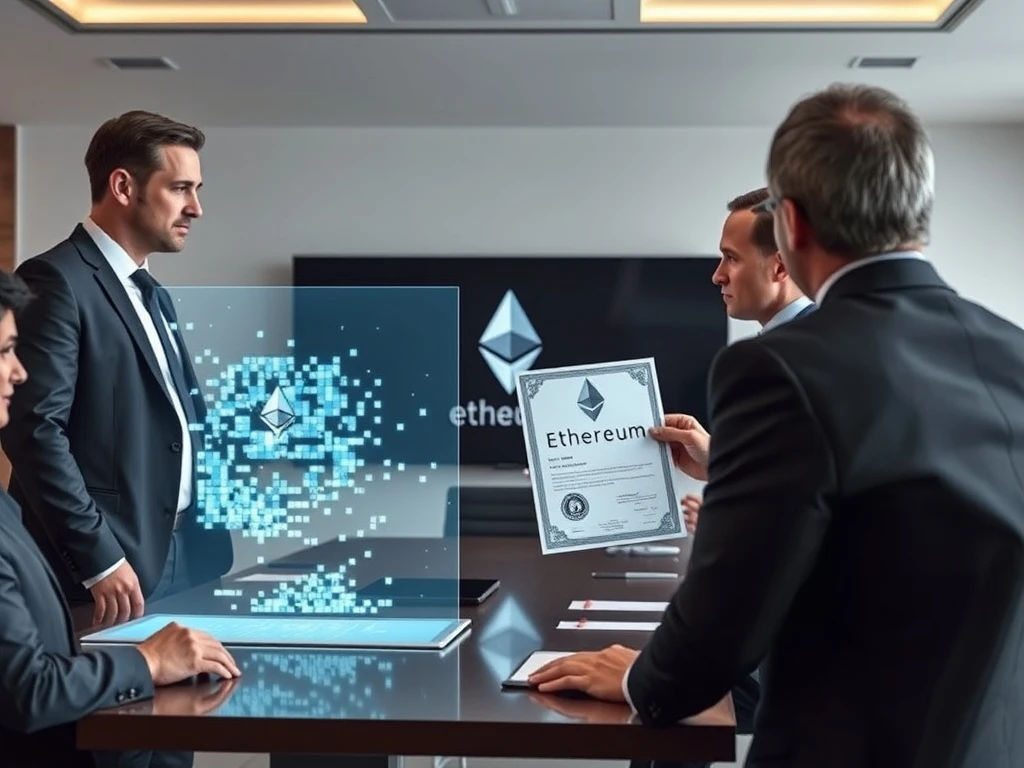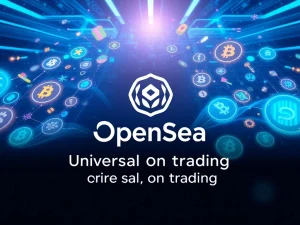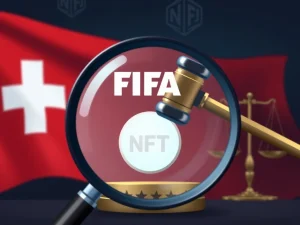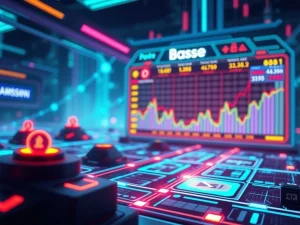Unlocking Institutional NFT Adoption: GameSquare’s Groundbreaking CryptoPunk Acquisition Signals a Paradigm Shift

In a groundbreaking development shaking up the digital asset world, Nasdaq-traded company GameSquare has made headlines with its audacious acquisition of CryptoPunk 5577. This isn’t just another NFT sale; it’s a $5.15 million deal structured through preferred shares, marking a significant milestone in the evolving landscape of institutional NFT adoption. What does this mean for the future of corporate treasuries and the broader crypto market? Let’s dive into the details.
GameSquare’s Landmark CryptoPunk Acquisition: A New Era for Digital Assets?
On July 18, 2025, GameSquare (GAME), a Nasdaq-traded entity, finalized the acquisition of CryptoPunk 5577, a rare ‘Cowboy Ape’ NFT from the iconic CryptoPunks collection. This isn’t your typical cash transaction. The deal, valued at $5.15 million, was uniquely structured through preferred shares issued to the NFT’s previous owner, DeFi pioneer Robert Leshner, founder of Compound. This innovative approach immediately sets the CryptoPunk acquisition apart.
The preferred shares are convertible into GameSquare common stock at $1.50 per share, a price intentionally set above the company’s current trading value of $1.30. This structure provides a clear incentive for Leshner to retain the equity, aligning his interests with GameSquare’s long-term success. The NFT has already been transferred to a wallet holding three other Punks, significantly expanding GameSquare’s on-chain art portfolio. This strategic move highlights a growing trend where companies are exploring NFTs not just as speculative assets but as integral components of their corporate treasury management.
Why This Institutional NFT Adoption Matters
GameSquare’s move isn’t an isolated incident; it aligns with a broader industry trend. Companies are increasingly exploring how NFTs can serve as both speculative assets and long-term value anchors within their financial strategies. This particular institutional NFT adoption is notable for several reasons:
- Hybrid Digital Portfolios: GameSquare already holds a substantial Ethereum treasury, recently bolstered by a $10 million ETH purchase, bringing its total holdings to over $52 million. By combining liquid tokenized assets like ETH with rare, high-value NFTs, the company is pioneering a hybrid digital portfolio strategy.
- Strategic Diversification: This approach mirrors traditional crypto treasuries but introduces a new layer of complexity and potential diversification. It allows companies to balance liquidity (via ETH) with unique, potentially high-appreciation assets (NFTs).
- Early Adopter Status: GameSquare positions itself as an early adopter in integrating diverse digital assets into its corporate balance sheet, potentially setting a precedent for other publicly traded companies.
Navigating the NFT Treasury Strategy: Challenges and Opportunities
While the potential for integrating NFTs into corporate treasuries is immense, it’s not without its hurdles. Implementing an effective NFT treasury strategy requires navigating several complex aspects:
Challenges:
- Illiquidity: Unlike ETH, which trades on numerous centralized exchanges with transparent pricing, NFTs often lack immediate liquidity. Their unique nature makes them harder to sell quickly without impacting price.
- Non-Standardized Valuation: NFTs lack universally accepted, transparent valuation frameworks. Determining a fair market value for a specific CryptoPunk, for instance, can be subjective and challenging for corporate accounting.
- Regulatory Uncertainty: The legal landscape for NFTs remains a gray area in many major jurisdictions. While cryptocurrencies face increasing oversight, NFTs are still evolving in terms of classification and regulation.
Opportunities & Innovative Solutions:
GameSquare’s deal structure offers a template for mitigating some of these challenges. By using preferred shares instead of cash, they:
- Preserve Liquidity: Avoided depleting their cash reserves, which is crucial for operational stability.
- Provide Stable Returns: Preferred shares offer fixed dividends and liquidation priority, providing a more stable return mechanism for investors compared to the volatile NFT market.
- Mitigate Regulatory Risks: Operating within established corporate finance frameworks (equity instruments) helps navigate some of the regulatory ambiguities associated with direct digital asset acquisitions.
While critics might question the immediate financial rationale, noting the $5.15 million is far below the $122.82 million peak bid for the same Punk in 2021, proponents argue this is a calculated bet on the cultural and historical significance of early NFT projects, which may retain value as newer collections depreciate.
The Resurgence of NFTs and What It Means for Ethereum News Today
This significant acquisition comes at a time when the NFT sector shows clear signs of recovery after years of decline during the ‘crypto winter.’ This resurgence is closely tied to the broader positive momentum in the crypto market, particularly in Ethereum News Today.
The ETH price has surged above $3,800 in 2025, and floor prices for top collections like CryptoPunks have rebounded to six-month highs, currently trading at over 48 ETH per item. Industry heavyweights like Arthur Hayes and Yat Siu of Animoca Brands are bullish on NFTs, speculating that they could regain prominence in this bull cycle, potentially even rivaling Ethereum’s influence. Hayes has suggested that CryptoPunks might reemerge as a dominant asset class, while Siu emphasizes their crucial role in strengthening the Ethereum ecosystem.
The CryptoPunk GameSquare NFT acquisition underscores this renewed confidence, demonstrating that blue-chip NFTs are attracting serious institutional capital once again. As the market continues to mature, these early projects are increasingly seen as digital artifacts with enduring cultural and historical value.
A Glimpse into the Future: Corporate Digital Asset Portfolios
GameSquare’s bold move with its CryptoPunk GameSquare NFT is more than just a headline; it’s a test case for a new frontier in corporate finance. The company’s dual holdings of ETH and rare NFTs exemplify a growing trend of diversification in corporate treasuries, balancing liquid, high-potential assets with unique, culturally significant digital artifacts.
As the market monitors GameSquare’s integration of the NFT into its treasury, the success of this deal may prompt broader corporate adoption of hybrid digital asset portfolios. Whether this model gains widespread traction will largely depend on investor confidence in NFTs’ long-term value and the development of more standardized valuation metrics for on-chain art. This pioneering approach could indeed serve as a template for other firms looking to navigate the evolving legal and financial landscape of digital asset acquisitions.
Frequently Asked Questions (FAQs)
Q1: What is CryptoPunk 5577, and why is its acquisition significant?
A1: CryptoPunk 5577 is a rare ‘Cowboy Ape’ NFT from the iconic CryptoPunks collection, one of the earliest and most valuable NFT projects. Its acquisition by Nasdaq-traded GameSquare for $5.15 million via preferred shares is significant because it represents a strategic move towards institutional NFT adoption, signaling a new era for corporate treasury management involving high-value digital assets.
Q2: How was the GameSquare CryptoPunk acquisition structured?
A2: The deal was structured through preferred shares issued to the NFT’s previous owner, Robert Leshner. These shares are convertible into GameSquare common stock at a price ($1.50) above the company’s current trading value ($1.30), incentivizing the seller to hold the equity. This method allowed GameSquare to acquire the NFT without depleting its cash liquidity.
Q3: What are the main challenges for companies adopting an NFT Treasury Strategy?
A3: Key challenges include the illiquidity of many NFTs, the lack of standardized and transparent valuation frameworks for digital art, and ongoing regulatory uncertainties surrounding NFTs in various jurisdictions. These factors can make it difficult for corporations to account for and manage these assets.
Q4: How does this acquisition relate to the broader Ethereum ecosystem?
A4: The acquisition highlights the resurgence of the NFT market, which largely operates on the Ethereum blockchain. With ETH surging above $3,800 and CryptoPunks floor prices rebounding, this deal reinforces the idea that NFTs are regaining prominence and can strengthen Ethereum’s ecosystem by attracting institutional capital and showcasing the utility of its network for digital asset ownership.
Q5: Could GameSquare’s approach become a template for other corporate digital asset acquisitions?
A5: Yes, GameSquare’s innovative use of preferred shares to acquire a high-value NFT could serve as a template. This approach mitigates liquidity concerns and navigates some regulatory risks by operating within established corporate finance frameworks, potentially influencing other firms to adopt similar strategies for hybrid digital asset portfolios.









